
Is Your Job Secure? A Framework For Deciding
If you have to wonder whether your job is safe, then it probably means you could benefit from spending time assessing your level of job security to ensure you are prepared for all possibilities.
This post will help you determine your exact level of job security using my job security spectrum and the scoring system for plotting yourself within the spectrum. I’ll also present strategies you can use to improve your job security, regardless of where you land today.
Contents
Predicting My Layoff Months Before It Happened
I began preparing for job loss well before I was actually laid off earlier this year thanks to having a gauge on my own level of job security. The layoff only confirmed my instincts while many of my colleagues seemed to be caught off guard
I knew my job wasn’t very secure back then thanks to the process I’ll share in this post. You’ll see that determining your job security isn’t difficult to do. I’ll teach you which factors are important and how to measure them so you can figure out how much security you have.
Introducing The Job Security Spectrum
Let’s start with an overview of my job security spectrum. The image below is a depiction of the job security spectrum which is composed of 4 tiers.
Starting from the right, the tiers flow for highest to lowest as follows:
- Tier 1: The Steve Jobs Zone
- Tier 2: High Job Security
- Tier 3: Flux Tier
- Tier 4: Low Job Security
Take a look at the tiers and make a guess as to where your job security currently falls? Odds are you are probably right.
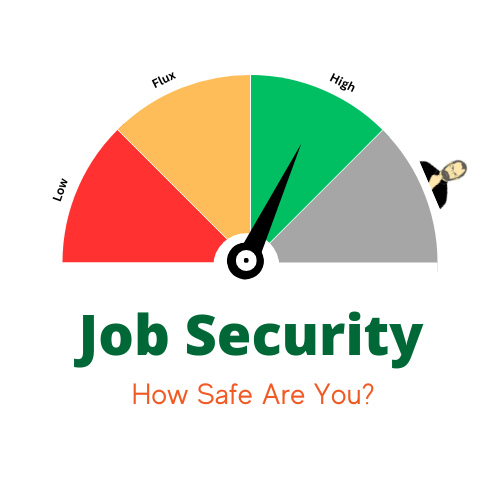
The Steve Jobs Zone Of Job Security
We know the story all too well. Steve Jobs co-launched Apple, built it to prominence, and was later fired from what was essentially his own company by the very person he hand selected to be CEO.
Jobs’ story is infamous due to him being re-hired 11 years later – to then take the company to unprecedented heights.
Job Security Lesson From The Steve Jobs Story: No Job Is Totally Secure
The idea that no job is totally safe is the most fundamental lesson about job security
Breaking Broke
If Steve Jobs can be fired, anyone can be fired. Think about it, practically no one in America would have had more job security than Jobs did within his own company. And he was still fired.
The idea that no job is totally safe is the most fundamental lesson about job security. This is what drives the highest tier of my job security framework.
Few of us occupy roles as prominent or important as the one Steve Jobs had when he was dismissed. Or that of other prominent founders to be ousted such as Travis Kalanick from Uber or Martin Eberhard from Tesla. If these guys can be fired, we can all be fired.
In terms of accessing your job security, take it as a rule of thumb to never consider yourself totally secure in your job. In other words, you can never be in the Steve Jobs zone of job security.
Your job security will fall in a lower tier of the spectrum and should come with an adequate, yet healthy dose of skepticism. The good news is that this very skepticism is what empowers you to excel as an employee and be prepared for worst case scenarios such as layoffs.
For a third time – if Steve Jobs can be canned, so can you.
The High Job Security Tier
Below the Steve Jobs tier of job security is the highly secure tier. This is the tier where those who believe their jobs are pretty safe will fall.
Those in this tier know they are expendable, but enjoy relative safety at work because most factors for job security are present. We’ll discuss what those factors are in a moment.
The Flux Job Security Tier
If you don’t know where your job security lies, then the flux job security tier is probably the tier for you.
Those in the flux tier either lack enough factors to feel safe in their jobs, or cannot properly quantify where they are. At the same time, they lack the negative signs that would place their job security in the low security tier.
In general, this is a risky tier to be in because 1-2 negative factors could cause you to slide into the low job security tier. It could also mean that you are already there and just don’t know it. The good news though is that you could just as easily increase your job security to the high tier.
Thus, this is why I named this tier the flux tier of job security.
The Low Job Security Tier
This should go without saying, but occupying this tier means that you have poor job security.
We’ll talk later about what to actually do if you find that you have low job security. But for now, I will say that you should have a very healthy dose of fear and motivation for change.
Your Level Of Job Security Is Ever Changing
Before diving into the specific factors that determine job security, I must preface things by saying that your job security is in constant flux.
This is because things change in the real world by the minute. By the same token, your job security can changes just as rapidly. For example, your beloved boss could suddenly become hospitalized and be replaced by a colleague who is your sworn enemy. An instance such as this could take your job security from the high tier to the low tier overnight.

To account for this, I suggest you constantly assess the status of your job security. You don’t necessarily have to plot this using the scoring system presented here, but you should always be taking a general “temperature check” based on new information.
7 Factors For Determining Job Security
There are nearly unlimited factors that can help determine your job security. Fortunately, you don’t need to measure them all to have a pretty accurate gauge of where you are.
I’ll present here the key factors driving job security in most instances. You will still want to consider factors unique to your situation, but the following list is a safe place to start:
- The Value You Bring
- The Quality Of Your Work Relationships
- Your Job Performance
- Macroeconomic Conditions
- Health Of The Job Market
- Whether Or Not You Are Redundant
- Your Company’s Stage Of Growth
1) The Value You Bring
The single most important factor driving your job security would be the value you bring to your company, business unit, and team.
If you are the most valuable employee in the company, you are extremely safe in your job. You can still be ousted like Steve Jobs was, but you should feel pretty secure.
Similarly, the most valuable employee in the accounting department is pretty safe because the accounting department is vital to company operations. Therefore, the most valuable employee in the accounting department is pretty vital to the company.
At the lowest level would be your value to your team. Being the most valuable person on your team makes you at least somewhat safe. Even if your team was disbanded, another manager would likely scoop you up. Most people know who the valuable employees are.
How To Gauge Your Value At Work
Simply think about the work you are doing and ask yourself how critical the work is to your company? If you were to vanish today, would it be business as usual or would your absence send things into a frenzy.
For example, the sudden loss of Steve Jobs caused a drop in Apple’s stock prices and sent the media into fervor because Steve was highly valuable to the company.
If your absence could be resolved by simply passing your work to another member of your team, then you probably aren’t all that valuable.
You may be in this situation and currently feel secure, but recognize that things can shift quickly. Directors are constantly keeping a pulse on their ranks and know exactly who can be cut first if push comes to shove.
2) The Quality Of Your Work Relationships
It’s all about who you know.
No truer statement has ever been uttered about the working world. And the same holds true for job security. Job security is a game of survival which means that those who are the most interconnected are the most well protected.
Being well liked and having good relationships even bodes well in cases of shaky performance. I know several people who I severely outperformed at my previous company – yet they survived layoffs. The difference? They were in high favor with all of the right people while I was the aloof maverick.
What is the quality of your relationships at work and are you friends with enough of the right people? It’s not just about having friends. You need to ensure you have the right friends. Again, job security is all about who you know.

3) Job Performance & Job Security
High performers generally have more job security than lower level performers. This is because performance is one of the main drivers of value – and value is the most significant determinant of job security.
That said, job performance is less important for job safety than quality of working relationships because people would rather work with a well liked low performer than a hated high performer. For example, Steve Jobs was widely disliked which made him an easy target for firing. He was clearly a high performer, but that could not trump his bad relationships.
In other words, job performance matters a lot when it comes to job security. Do a good job and you will be safer. Just don’t deride yourself into thinking performance is the only thing that matters.
4) Macroeconomic Conditions
By and large, macroeconomics are what drive job security at scale. For example, a spike in inflation typically results in massive job loss such as those seen in early 2023.
Given its relevance on job security, we should know how to gauge the state of the economic environment. This could be quite difficult for most people to actually do with the considerable number of variables to measure and noise to filter through.
With this in mind, I’ll share my personal list of factors for gauging the economic environment. I’ll also share how you can put these together to determine their impact on your job security.
How Inflation Impacts Job Security
Inflation impacts job security by way of the rising prices that occur in an inflationary environment. As operating costs increase, firms look for ways to remain viable and often cut headcount to save money.
Given the implications that inflation have on job security, we should all monitor the current status of inflation closely.
How To Gauge Inflation & Job Security
Most people can simply monitor mainstream channels to get a good sense of where things land.
You’ll notice that people rarely discuss inflation in good times – which probably means inflation is a valid concern when everyday people start to discuss it. In other words, hearing the Uber driver mention inflation means you should take notice.
For a more definitive gauge of inflation expectations, you can review the New York Fed’s Survey of Consumer Expectations results. This is a good resource because it contains projections for one, three, and five year intervals.
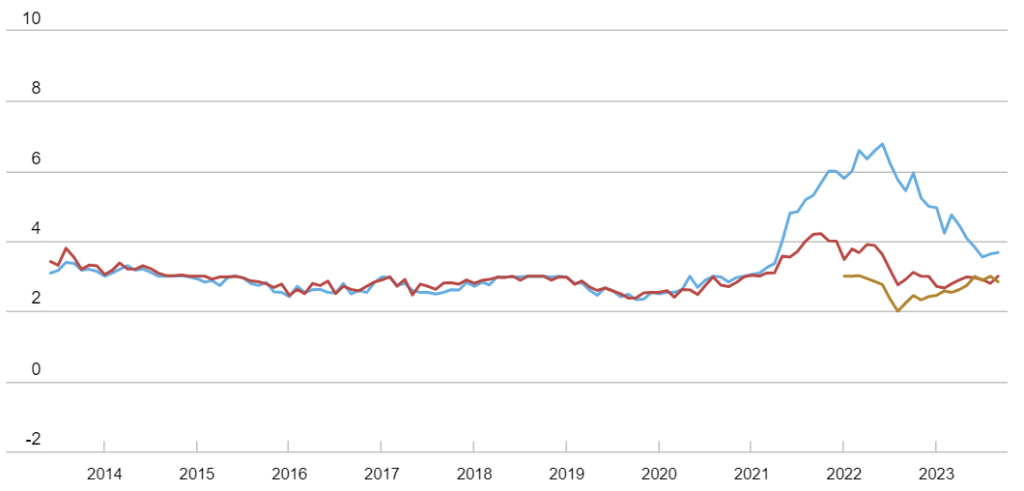
Seeing elevated inflation expectations at any point in time should be taken as a signal that your job safety is at risk. This doesn’t mean that you will necessarily be fired, but it does mean you should prepare.
On the other side of the coin, low inflation expectations signal that your job may be more secure. If you are wise, you will use the good times to clean up your financial situation and get yourself on track with where you need to be.
Are We In A Bull Market Or Bear Market?
Both bull markets and bear markets are important for determining job security – albeit for different reasons..
Though no widely agreed upon definition exists, bear markets are essentially extended periods of declining asset prices. Bull markets fall on the other end of the spectrum and denote periods of rising asset prices.
How Market Status Impacts Job Security
Generally, investor confidence is low and fear is widespread during bear markets. This fear often precipitates what becomes a self perpetuating cycle of layoffs, increasing levels of fear, and additional layoffs.
Bull markets are different because it is hard not to get swept into the exuberance when things are heating up and going well. Companies follow suit as they often go on hiring sprees to fuel growth during bull markets.
Just look at the likes of Amazon who doubled corporate staff from 2019 – 2022. Or Meta who did the same in an even shorter amount of time.
What this essentially means is that the state of the market has an impact on your job security. That is, your job is relatively safer in a bull market than during a bear market.
That last statement probably seems obvious, but the nuance here is that you must also be able to gauge the state of the market during transitory periods or periods of uncertainty.
It is obvious that our jobs aren’t very secure when companies start to lay people off. But what about in the months leading up to those layoffs – were the signs not present? The usually are for those paying attention. This is why it pays to always have a pulse on the status of the market.
What is the Sentiment of the general public?
I believe that market sentiment is the single best economic indicator to consider when gauging job security.
Value truly is in the eye of the beholder. And though we tend to focus on the numbers, it is usually what is in the hearts and minds of the people that determines what happens in the economy.

If people are generally happy and optimistic, your job is more secure in the short run. As sentiment wanes, lower confidence makes your job less safe overall.
The reason for this is the impact public sentiment has on asset prices.
Positive sentiment is characterized by an environment of investor confidence. Investor confidence leads to rising asset prices. Rising asset prices produce stability and growth. All good things for job security.
The opposite happens when investor sentiment is low. Losses of confidence result in sell-offs which drive down asset values. These lower values could eventually mean layoffs. Thus, job security is lower when sentiment is down.
Are asset prices overvalued, undervalued, or just right?
Asset values have a counterintuitive impact on job security. High asset values typically signal a healthy economy and high public sentiment. However, these signals can mislead us into a false sense of job security if we fail to project the future.
For example, the S&P 500 recorded a record high 4796.56 in January, 2022. It could have been easy to think that prices would continue to rise forever, but that mark was a peak that would see a 20% decline by January the following year – also the month where tens of thousands of workers were laid off.
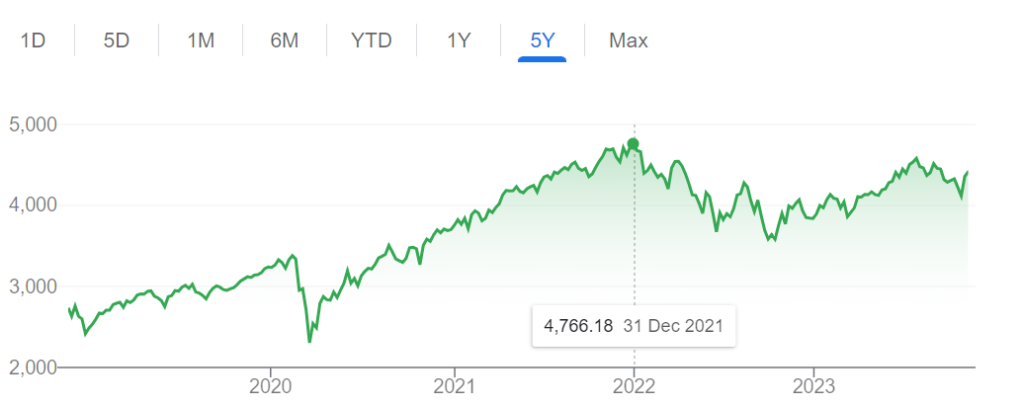
How Asset Values Impact Job Security
The key takeaway here is that overvalued asset prices should be taken as a risk to your job security. While tempting to rejoice in the marvelous returns, we should recognize that an overvalued stock market always corrects itself at some point. It is never a matter of if a correction will occur – only when.
The ideal state of asset prices for job security is to have relatively accurate valuations.
If valuations are too high, we can anticipate the eventual correction. It is during these corrections that we usually see layoffs. If values are too low, companies have likely already taken cost cutting measures such as headcount reductions.
5) The Health Of The Job Market
The job market has an enabling impact on our job security. That is, working in a growing industry with ample opportunity makes us more secure because we know we can always find work.
Job security is not just in our current role, but in our ability to find other work when necessary.
We all enjoy greater job security when the job market is robust. Opportunities abound, salaries rise, and career progression becomes easier. We should take advantage of these periods by extracting as much money as possible and accelerating our climb up the career ladder.
In contrast, a weakening job market in our specific industry or as a whole, should be taken with concern for job safety.
If our industry is stagnating we are less safe. The same is true if there are few new roles available for the positions which we are qualified for. Losing your job in these instances has huge implications, so you will feel less secure in your current role.
6) Redundancy Is Risky For Job Security
redundancy: the inclusion of extra components which are not strictly necessary to functioning
Perhaps the most obvious indicator of job security is the unique value one provides to their organization and industry. A highly skilled specialist with rare abilities is far more secure than a generalist working in a department of several dozen others doing the same job.
This is why doctors are paid so well. They possess knowledge, skills, and qualifications that are unique and hard to come by. Meanwhile, your typical fast food worker can be replaced within an hour if need be.

I knew my job wasn’t safe after my former boss asked me to form a networking cohort of individuals doing my exact same job in other parts of the company. The networking was good, but the real benefit of this was me having exposure to just how redundant I was.
Ask yourself how redundant you currently are? Your job is less secure if you find that you are very redundant, and a lot safer if you are specialized and rare. This doesn’t necessarily mean that you should panic, it just means you should be aware and prepared.
7) Your Company's Stage Of Growth
What stage of evolution is your company in? Are they a fast paced startup or a rapidly growing giant? Perhaps they are a stalwart with a significant amount of stability? Further, are they in a period of acquisition or merger?
All of these things matter for job security.
The stalwart company offers the greatest job security. These companies are typically more mature in their life cycles and they have experience navigating economic highs and lows.
On the other hand, the fast paced startup and rapidly growing giants offer much more excitement with more risk to job security. For example, the company that laid me off had notoriously doubled in size in the 3 years preceding my layoff.
Perhaps the riskiest environment for job security is the company experiencing a merger or acquisition. A sudden change such as these usually means new managers, loads of redundancy, and restructuring to stabilize after the changes. This all means that your job security is generally more at risk.
How To Score Your Job Security
With an understanding of the factors for determining job security, you can combine them to get an accurate gauge of where your job security lands on the job security spectrum. This section will show you how to score your job security on the spectrum, so let’s hop in.
Job Security Matrix Scoring System
We’ll start the process of scoring our job security by further breaking down the matrix into scoring tiers. In the image below you will see the job security matrix subdivided with numerical tiers from 1 thru 10. At the top level of the matrix are tiers 9-10. We’ve already established this as the Steve Jobs tier of job security and is off limits since no job is totally secure.
That leaves tiers 1 thru 8 for us to actually plot our level of job security within.
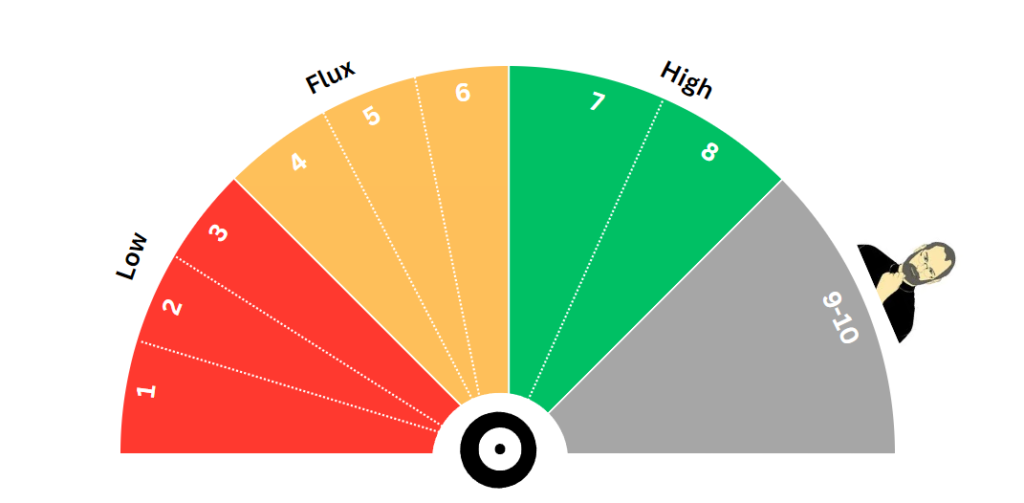
Step 1) Score Each Job Security Factor
To move up or down the matrix you will take one job security factor at a time and score that factor based on the realities of your situation. Each factor will be individually scored based on a measure of high, neutral, or low.
For instance, you may determine that you have stellar working relationships which means you will rank this factor as high. Do this for all of the factors and write down your measurements.
Note: There is no medium ranking for this exercise. You are either confident in the measure being high or low with certainty. Anything else is considered neutral with no movement in either direction.
That said, here is my personal breakdown at the time of writing as an example. I’ve also included my rational to highlight how you can assess these factors:
My Job Security Scoring
The Value I Bring: Neutral
Though I’ve delivered some valuable outputs, I can’t definitively say that my value is appreciated across the board. Those I work most closely with will attest to my value, but I don’t believe that those who hold the power can see it as clearly.
The Quality Of My Work Relationships: Low
I’ve never cared to be well liked at work because I value my freedom too much to spend time trying to be in the good graces of others. At the same time, I’m not a complete jerk to people at work and am mostly cordial and respected.
Still, I scored this one low because I can sense a bit of friction with some key people who hold the status of my job security in their hands. It’s one thing when a relative nobody dislikes you, but much more significant when a power player looks at you disapprovingly.
My Job Performance: High
As I mentioned in my article about going alcohol-free, I perform at a high level in most of the things I do. Work is no different as I get the job done well.
Macroeconomic Conditions: Low
As far as I’m concerned, the macroeconomic environment is not great for my job security. While general sentiment is high, leading indicators are low. I also believe that assets are overpriced, and the FED is adding gasoline to an already lit fire with increasing levels of debt.
The Health Of The Job Market: High
The job market in particular skillset is in high demand. Additionally, markers of an overall healthy labor market are present. I don’t think I will have trouble finding work under current conditions.
Am I Redundant: High
There is currently no one in my company doing exactly what I am doing. Nor is there anyone that could easily replace me.
My Company‘s Stage Of Growth: High
Fortunately, I am working at a company that is relatively stable and well positioned in a robust industry. The company does have aspirations of growth, but are currently in a phase of mobilizing to begin that growth. This is a good position to be in for the sake of job security.
Step 2) Identify The Job Security Starting Position On The Matrix
Your beginning position for scoring your level of job security is the midpoint of the remaining tiers. This comes out to around position 4.5 as seen below.
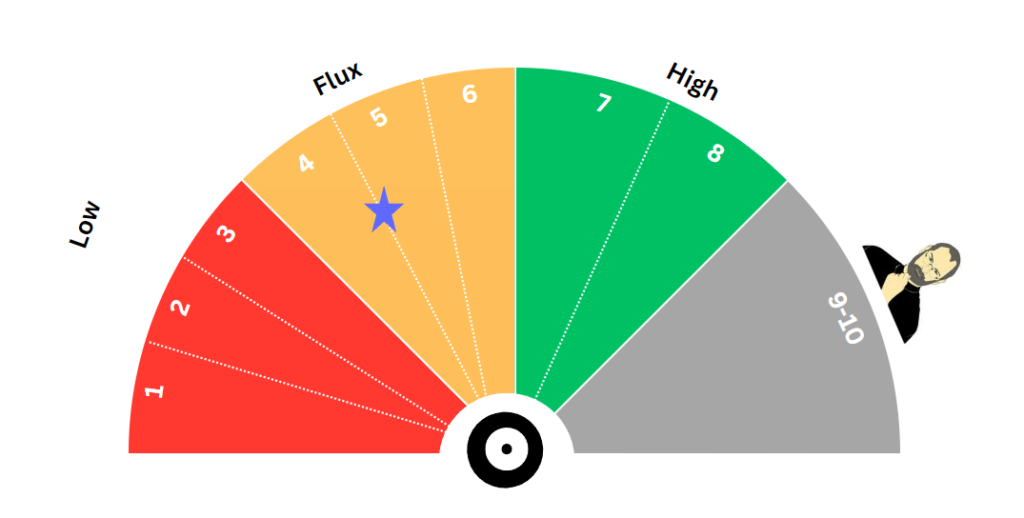
Step 3) Moving Up Or Down The Job Security Matrix
To move up or down the matrix you will take one job security factor at a time and move along the matrix based on how you measured that factor.
A measure of high for a particular factor moves you up the matrix to the next line. A measure of low moves you down one line on the matrix. A neutral measure means you don’t move in either direction.
Below is an example of my final landing spot along the matrix. You can see that I currently measure myself at around 6.5 which is puts me in the squarely between the flux and high security tiers.
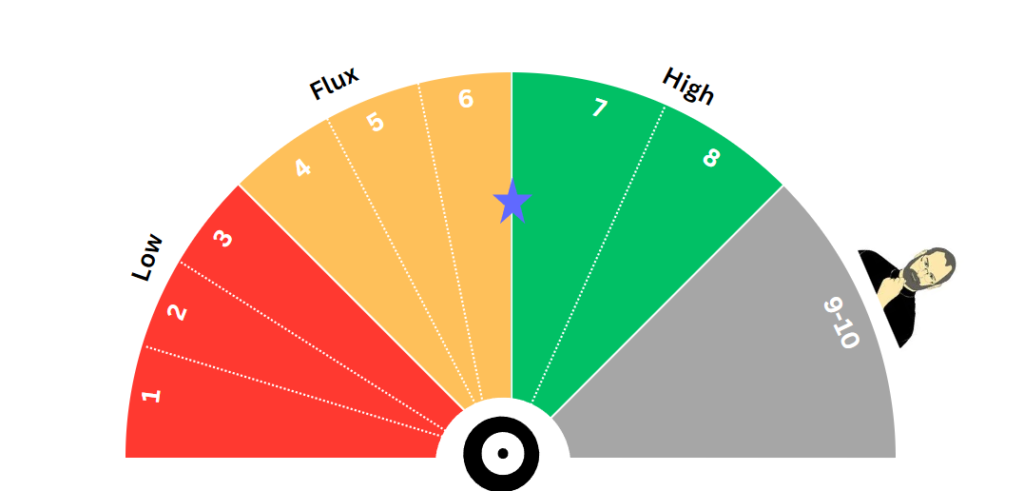
How To Improve Your Job Security
In a nutshell, improving job security is all about focusing on the individual factors that lower your job security and fixing them. Following is a breakdown of specific ways to tackle and improve each factor that impacts your level of job security.
I’ll also present a few strategies for improving job security that don’t necessarily have to do with any of the individual factors.
Improving Your Value Improves Job Security
There are many ways to become a more valuable employee, but the most direct is to ensure you are working on valuable things. This can be accomplished by surveying the landscape within your organization, identifying what’s most important, and aligning yourself with those initiatives.
If you don’t know where to start, simply ask your boss to throw more higher priority work your way.
Improving Your Work Relationships
Improving work relationships may take a bit of time, but it is worth the effort. The first step to becoming more well liked is to stop being a jerk and eliminate the habits that make others dislike you.
The second step is to identify those who currently see you less favorably and work to improve those relationships. The final step is to lock things in much like you would with my success stacking principle. You’d want to avoid becoming nicer for a period to only revert back to your former self.
Increasing Your Performance At Work
Simply put, performance at work is all about output. We are all measured by how much, how fast, and how precise our work is.
These are the factors you want to focus on to raise your level of performance to improve job security. Strive to produce more than others and to get things done faster. Also ensure that your work is quality by triple checking it for precision. Colleagues and managers have very little patience for errors showing up in work results.
Fixing The Issue Of Redundancy
Resolving an issue of redundancy starts with recognizing you have one. This can be done by paying attention to your work environment, studying your org charts, and having conversations with people at your company. Aside from job titles, you want to be on the lookout for people functioning in your same capacity.
Once you spot redundancy, you remedy it by setting yourself apart. You do this by upskilling and filling needed voids, changing positions, or moving to a company where your skills are in shorter supply.
Ways To Feel Psychologically Secure In Your Job
I believe that part of job security starts in the mind. The more comfortable you are with the set up of your life, the less angst you will have over the safety of your job.
I addition to the tactics above for tangibly improving job security, you can deploy several strategies for improving the way you thinking and feel about your safety at work.

A Debt Free Lifestyle Makes You More Immune To Job Loss
In addition to enhancing your sense of freedom, a debt free lifestyle also helps you feel more secure in your job. When you have debt you are obligated to service the debt on an ongoing basis. For most people, the day job is what provides the means to service such debts.
This results in most people being involuntarily dependent on their jobs and at greater risk should they lose them. In other words, having debt makes you less secure because your dependence on your job is higher.
Fortunately, being debt free changes things.
A debt free lifestyle improves your job security as it lowers your dependence on a job because you no longer work to service debt. You simply collect your paychecks, cash flow your expenses, and save the rest.
An Updated Resume
An updated resume can help you feel psychologically secure in your job for several reasons.
For starters, keeping your resume updated on a regular basis helps ground you to the value of the work you produce. Things you have done will certainly be forgotten if you only update your resume every few years. Doing it more frequently ensures that none of your hard work slips through the cracks.
Keeping an updated resume will also empower you from a job acquisition perspective. If you are always prepared to kick-off a job hunt, you are less vulnerable to the whims of your current position.
Finally, an updated resume will help you stay in sync with the ever changing job market. This will help ensure you avoid becoming redundant as you will always know which skills are in demand and plot them on your resume.
Let’s talk about the job market next.
Keep A Pulse On The Job Market
Let’s imagine a fictitious character named Jim. Jim is a technology specialist for one of the hottest new platforms and has been in that capacity at his company for 10 years.
Jim never read this article or thought much about his job security. In fact, Jim thought he was untouchable because he was the only person in his company to know this application inside and out.
One day, Jim’s firm was acquired by a competitor and Jim’s entire department was laid off. Jim was at square one.
After a few weeks of sulking, Jim finally picked himself up and began looking for jobs. But, to Jims dismay, no one was hiring specialists of Jim’s platform because there were newer and better platforms on the market. Jim had become structurally redundant and unemployable.
Seem feasible? Sadly, it happens all the time.
You Must Keep Tabs On The Job Market
Jim made a few mistakes in this story. Thinking his job was completely secure was the first blunder. Closely follows is the fact that Jim did not know the job market.
Had Jim kept track of the job market, he would have known that his role was being phased out. He would have noticed that fewer and fewer opportunities were available. He could have evolved along with the market and actually leveraged his former skillset to his advantage as he stayed ahead of the curve. Not behind it.
The moral of this story? Don’t be like Jim. Know the job market. Recognize the trends. Stay ahead of the curve and you will be more secure in your job.
Will Robots Take Your Job?
An emerging threat to job security for many people is the rise of technology with particular consideration for how Artificial Intelligence will impact the safety of our jobs in the future. Research and advisory firm Forrester validates this concern with a report that estimates that AI will replace 2.4 million jobs by 2030.
The accuracy of Forrester’s projections should be of little concern as we acknowledge and accept the fact that AI is here and will only grow in relevance. With this in mind, our best course of action is to start preparing for the technological revolution looming on the horizon.

Protecting Our Careers From AI
The first step to prepare for the AI transformation is to assess the potential impact it will have on your specific role and industry. Explore these details with an open mind and don’t dismiss any theories. We can’t predict the future, so must be prepared for all contingencies.
The second thing you can do to prepare for AI is to figure out a way to leverage it to your benefit.
Software developers, for example, may automate portions of their code. At the same time, writers may use AI to proof their creations. Adopting AI could also mean identifying new skills and knowledge to acquire so that you can be in front of the cutting edge and not left behind.
In instances such as these, it is best to embrace the new technology rather than resisting. Just like in my example of Jim earlier, we want to stay up to date so we can be sure our jobs are protected.
Is Your Job Safe
Now that you’ve read this post and completed the job security scoring matrix, I’d like to hear from you on how safe your job is. Did you have any revelations about your job security or did this post confirm your previous thoughts? And what does your future hold in terms of career prospects?
Drop me a comment below and let’s discuss job security from your perspective!
